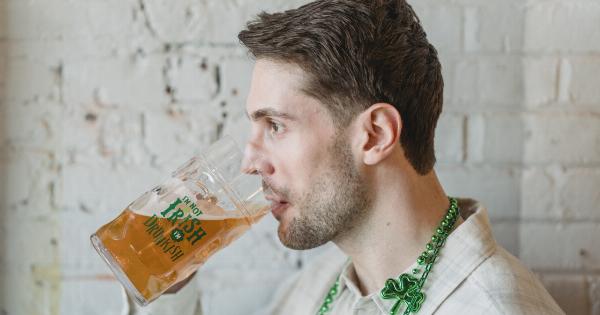Alcohol consumption has always been a part of social culture in many parts of the world. Having a drink with friends, family or colleagues is often considered as a way to socialize, unwind and relax.
However, the line between social drinking and problematic drinking can be very thin, and it’s essential to know when to draw that line.
Problematic drinking habits can lead to various physical and psychological health issues, affect your overall quality of life, and have an impact on your relationships with others.
But how can you recognize problematic drinking habits? Here are the five red flags that indicate whether you or someone you know may have a problem with drinking:.
1. Regularly exceeding moderate drinking guidelines
The National Institute on Alcohol Abuse and Alcoholism defines moderate drinking as consuming up to one drink per day for women and up to two drinks per day for men. Exceeding these guidelines regularly can be a red flag for problematic drinking habits.
It’s important to note that one drink doesn’t always mean one standard serving of alcohol. A standard drink is equal to 12-ounces of beer, 5-ounces of wine, or 1.5-ounces of distilled spirits.
Binge drinking is also a type of excessive drinking that can lead to problematic drinking habits.
Binge drinking is defined as consuming a large amount of alcohol (four or more drinks for women and five or more drinks for men) in a short period of time (within two hours). Binge drinking can increase the risk of accidents, injuries, and alcohol poisoning.
2. Drinking to cope with stress or other emotions
Drinking to cope with stress, anxiety, or other emotions is a common sign of problematic drinking habits. It’s easy to get into a pattern of drinking to deal with negative emotions, but this can quickly lead to dependence on alcohol.
It’s important to learn healthy coping mechanisms to deal with difficult emotions such as meditation, exercise, or talking to a counselor.
3. Neglecting responsibilities
If drinking interferes with daily responsibilities such as work, school, or parenting, it can be a red flag for problematic drinking habits.
Neglecting these responsibilities can lead to negative consequences like losing your job, failing courses, or damaging your relationship with your family or friends.
4. Experiencing blackouts or memory loss
Blackouts or memory loss after drinking can be a sign of problematic drinking habits. Blackouts occur when a person loses their ability to recall certain events or periods after alcohol consumption.
This can be very dangerous as the person may put themselves or others at risk without remember what they did or said. If you or someone you know regularly experiences blackouts or memory loss after drinking, it’s time to seek help.
5. Continuing to drink despite negative consequences
If you or someone you know continues to drink despite negative consequences, it’s a major red flag for problematic drinking habits. Negative consequences can include legal issues, damaged relationships, poor health, or financial problems.
Drinking despite these consequences can signal dependence on alcohol and indicate a need for intervention.
Conclusion
Recognizing the signs of problematic drinking habits can help you or someone you know get the help they need to break the cycle of addiction. If you or someone you know shows any of these red flags, it’s important to seek professional help.
Treatment options include behavioral therapy, medication, and support groups that can provide tools to help manage the addiction and maintain sobriety.






























